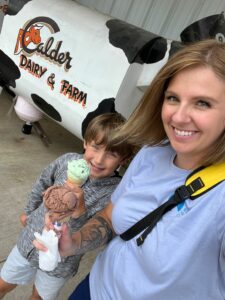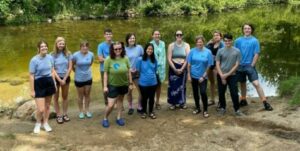Theresa Short participated in HRWC’s summer field internship in 2023. She is an Environmental Studies and Sustainability student at Michigan State University. Here she shares her experience.
Exploring careers in environmental science

I have spent the past 15 weeks working with the Huron River Watershed Council as a summer intern, and I can easily say that it has been the most valuable experience I’ve had throughout the seven years that I have spent in college so far. I have had a more non-traditional pathway to get to this point than most of my co-interns this summer. I am a 33-year-old student and married mom of two young kids, working on my second bachelor’s degree at Michigan State University. My first is in Psychology, so I had no previous understanding of what a career in environmental science might even entail, but in the 10 years since I finished my first degree, I continually felt pulled to work within the natural world. I came across the opportunity to join the HRWC internship while browsing the internet one night – one of many that I have spent searching for some job title that would stand out and tell me what I want my future to look like. I am so grateful that I found this instead.
When I started my degree last fall, I felt directionless. So I decided to simply put myself in the places where environmental discussions exist. I hoped that through the coursework, I would find my way to the space where I belong. This one summer has catapulted me much further towards that space than I could have imagined when I signed up with HRWC to spend a few months exploring outdoors. I have gained so much incredible knowledge about the Huron River watershed itself. We have worked on projects that have taught us about river habitats and the macroinvertebrates and mussels that live there, experienced new tools to measure the chemistry and volumetric flow of the Huron, spent many weeks inspiring young people in the community to help care for the river and sharing in the recreational aspects of it with them, weeded lots of beautiful rain gardens, became familiar with some invasive species both on land and in water, and even learned about the river’s relationship with storm drains through cataloguing the trash that they catch.
The power of people
But if I could pinpoint the single reason that I’ve experienced incalculable growth in such a short time span, it comes down to the people. First – thank you to the entire HRWC staff. From the initial interview to our goodbye lunch, the staff consistently created an environment where we could feel welcomed and valued as a real part of the team, regardless of our individual backgrounds and situations outside of the internship. They were eager to share all they know, and provided us with hope, confidence, and encouragement. We also had the invaluable opportunity to hear from folks working all throughout the organization, and some of the other organizations they partner with, at a series of “lunch and learns.” We had our eyes opened to many possible careers related to a variety of aspects of environmental work, and our minds filled with the wisdom gained from each professional’s unique path as they shared their story.
Second – thank you to my fellow interns. I am grateful to them for the inclusive culture that they, too, helped create for all of us. Through the genuine camaraderie that we so quickly formed while wading upstream and helping each other get unstuck from the muck, I have learned (and laughed) so much. Listening to their journeys, motivations, and plans for their futures, has given me a glimpse into what the next generation of environmental professionals will look like, and I am proud to know I will be working alongside them.
A community that cares for the river

credit: HRWC
I believe the official word for all of this is “networking.” The one-sentence-summary is that this internship has been a great opportunity for networking. But for me, the
more accurate word is “community.” Through this internship, I have learned about the community that is caring for the river—from the residents living in the watershed, to the organizations that partner with HRWC, to the students from every age group that will become the next leaders. I have learned how integral it is to find a community that is interested in the things that you are passionate about. And to create your own if it doesn’t exist yet.
My biggest takeaway from this summer as an HRWC intern is that doing good work requires connection. None of us can do it on our own. I still don’t know what I want to be when I grow up. But now I know that I have always been an important strand of the complex web that has a great impact on the natural world. Thankfully, we don’t have to do it on our own. There are so many people working toward the same purpose, in their own ways. And no matter the job title(s) that end up catching my eye, I have realized that I am already in the space where I am certain I belong.
Thank you, HRWC.
-Theresa Short
About HRWC’s Summer Internship
HRWC’s summer internship program has provided hundreds of students with an opportunity to explore environmental science and communications careers first-hand since 2013. HRWC’s education program goal is two-fold: to spark a life-long interest in science and the environment within every student, and to help build the foundation for a career in a STEM discipline by providing accessible experiences to young people of all backgrounds. The 2023 program was supported in part by Pure Oakland Water, CivLab, Great Lakes Fisheries Trust, and Toyota. Read more about HRWC’s summer internships these two blog posts, Thank You Summer Interns 2023 and Summer Learning Energizes Future Environmental Scientists. Also check out this video showcasing our 2022 Field Interns. HRWC generally posts its internship application in December preceding the summer field season on our jobs page https://www.hrwc.org/about/staff/jobs/.



